|
Books Should Be Free Loyal Books Free Public Domain Audiobooks & eBook Downloads |
|
|
Books Should Be Free Loyal Books Free Public Domain Audiobooks & eBook Downloads |
|
Philosophy Books |
|---|
|
Book type:
Sort by:
View by:
|
By: Friedrich Nietzsche (1844-1900) | |
|---|---|
 Beyond Good and Evil
Beyond Good and Evil
Beyond Good and Evil, by Friedrich Nietzsche A searing indictment of concepts like “truth” and “language” Beyond Good and Evil, by Friedrich Nietzsche is a deeply thought provoking book that forms one of the keystones of modern thought and politics. In this book, Nietzsche takes the position that our subservience to fixed perspectives that are forced on us by our language and our ideals make us incapable of perceiving reality. He propounds the theory that ideals are not fixed but change over time, often dramatically, and end up becoming the exact opposite of what they originally were... | |
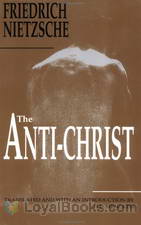 The Antichrist
The Antichrist
Save for his raucous, rhapsodical autobiography, Ecce Homo, The Antichrist is the last thing that Nietzsche ever wrote, and so it may be accepted as a statement of some of his most salient ideas in their final form. Of all Nietzsche’s books, The Antichrist comes nearest to conventionality in form. It presents a connected argument with very few interludes, and has a beginning, a middle and an end. | |
 Case of Wagner / Nietzsche Contra Wagner / Selected Aphorisms
Case of Wagner / Nietzsche Contra Wagner / Selected Aphorisms
A collection of three of Nietzsche's writings concerning the music of Wagner. In particular, he relates Wagner's music as degenerate, unrefined and unintelligent and relates it to a gradually degenerating German culture and society. The translator provides a detailed introduction. | |
 Complete Works of Friedrich Nietzsche: Volume 3
Complete Works of Friedrich Nietzsche: Volume 3
Volume 3 of the complete works contains several short critical introductory essays, five lectures under the heading "On the Future of our Educational Institutions," and finally an essay by the author entitled "Homer and Classical Philology." As always, Nietzsche believes in the importance of classical thought. | |
 Birth of Tragedy
Birth of Tragedy
In this famous early work of German philosopher Friedrich Nietzsche, he investigates the artistic characteristics of Apollonian and Dionysian characteristics in Greek art, specifically in Greek tragedy as it evolved. Then he applies his conclusions about Greek tragedy to the state of modern art, especially modern German art and specifically to the operas of Richard Wagner. | |
By: Friedrich Schiller (1759-1805) | |
|---|---|
 Philosophical Letters of Frederich Schiller
Philosophical Letters of Frederich Schiller
| |
By: Friedrich Wilhelm Nietzsche (1844-1900) | |
|---|---|
 Homer and Classical Philology
Homer and Classical Philology
| |
 We Philologists Complete Works of Friedrich Nietzsche, Volume 8
We Philologists Complete Works of Friedrich Nietzsche, Volume 8
| |
 Thoughts out of Season Part I
Thoughts out of Season Part I
| |
By: Fyodor Dostoyevsky (1821-1881) | |
|---|---|
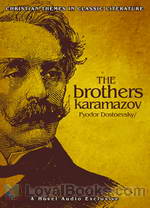 The Brothers Karamazov
The Brothers Karamazov
Set in 19th century Russia, The Brothers Karamazov (Russian: Братья Карамазовы) is the last novel written by the illustrious author Fyodor Dostoyevsky who died a few months before the book's publication. The deeply philosophical and passionate novel tells the story of Fyodor Karamazov, an immoral debauch whose sole aim in life is the acquisition of wealth. Twice married, he has three sons whose welfare and upbringing, he cares nothing about. At the beginning of the story, Dimitri Karamazov, the eldest son who is now a twenty-eight year old war veteran, returns to his home town to claim the inheritance left to him by his dead mother... | |
By: G. K. Chesterton (1874-1936) | |
|---|---|
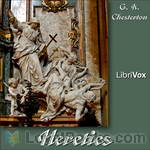 Heretics
Heretics
The Author Gilbert Keith Chesterton was born in London, England on the 29th of May, 1874. Though he considered himself a mere “rollicking journalist,” he was actually a prolific and gifted writer in virtually every area of literature. A man of strong opinions and enormously talented at defending them, his exuberant personality nevertheless allowed him to maintain warm friendships with people–such as George Bernard Shaw and H. G. Wells–with whom he vehemently disagreed. Chesterton had no difficulty standing up for what he believed... | |
 Orthodoxy
Orthodoxy
Orthodoxy is a book that has become a classic of Christian apologetics. In the book's preface Chesterton states the purpose is to "attempt an explanation, not of whether the Christian faith can be believed, but of how he personally has come to believe it." In it, Chesterton presents an original view of the Christian religion. He sees it as the answer to natural human needs, the "answer to a riddle" in his own words, and not simply as an arbitrary truth received from somewhere outside the boundaries of human experience. | |
By: G. S. (George Sumner) Weaver (1818-1908) | |
|---|---|
 Aims and Aids for Girls and Young Women On the Various Duties of Life, Physical, Intellectual, And Moral Development
Aims and Aids for Girls and Young Women On the Various Duties of Life, Physical, Intellectual, And Moral Development
| |
By: Gelett Burgess (1866-1951) | |
|---|---|
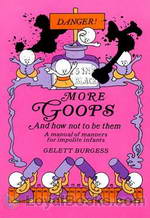 More Goops and How Not to Be Them
More Goops and How Not to Be Them
Deep in the heart of every parent is the wish, the desire, to have other adults tell us, in an unsolicited way, just how very polite one’s child is! This perhaps was even more the case in 1903, when Gelett Burgess produced his second book on the Goops. With entertaining cartoons – cariacatures of misbehaving children – he described many different breaches of tact and good manners. Burgess wrote several books of poetry on the Goops, each poem describing some significant way in which an unthoughtful or unkind child could offend polite society and often offering the hope that the listener would never behave that way... | |
By: George Berkeley (1685-1753) | |
|---|---|
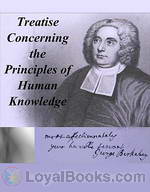 A Treatise Concerning the Principles of Human Knowledge
A Treatise Concerning the Principles of Human Knowledge
A Treatise Concerning the Principles of Human Knowledge, Part 1 (Commonly called “Treatise” when referring to Berkeley’s works) is a 1710 work by the Irish Empiricist philosopher George Berkeley. It largely seeks to refute the claims made by his contemporary John Locke about the nature of human perception. Both Locke and Berkeley agreed that there was an outside world, and it was this world which caused the ideas one has within one’s mind. Berkeley sought to prove that the outside world was also composed solely of ideas, suggesting that “Ideas can only resemble Ideas”... | |
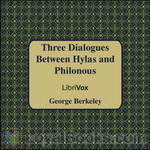 Three Dialogues Between Hylas and Philonous
Three Dialogues Between Hylas and Philonous
Berkeley uses Hylas as his primary contemporary philosophical adversary, John Locke. A Hylas is featured in Greek mythology and the name Hylas is derived from an ancient Greek word for “matter” which Hylas argues for in the dialogues. Philonous translates as “lover of mind.” In The First Dialogue, Hylas expresses his disdain for skepticism, adding that he has heard Philonous to have “maintained the most extravagant opinion… namely, that there is no such thing as material substance in the world.” Philonous argues that it is actually Hylas who is the skeptic and that he can prove it. Thus, a philosophical battle of wit begins. | |
 A Essay Towards a New Theory of Vision
A Essay Towards a New Theory of Vision
| |
By: George Herbert Palmer (1842-1933) | |
|---|---|
 The Nature of Goodness
The Nature of Goodness
| |
By: George Horace Lorimer (1869-1937) | |
|---|---|
 Letters from a Self-Made Merchant to His Son
Letters from a Self-Made Merchant to His Son
Being the Letters written by John Graham, Head of the House of Graham & Company, Pork-Packers in Chicago, familiarly known on 'Change as "Old Gorgon Graham," to his Son, Pierrepont, facetiously known to his intimates as "Piggy." George Horace Lorimer was an American journalist and author. He is best known as the editor of The Saturday Evening Post. | |
 Old Gorgon Graham More Letters from a Self-Made Merchant to His Son
Old Gorgon Graham More Letters from a Self-Made Merchant to His Son
| |
By: George J. Holyoake (1817-1905) | |
|---|---|
 English Secularism
English Secularism
What is Secularism? "Secularism espouses the cause of the world versus theology; of the secular and temporal versus the sacred and ecclesiastical. Secularism claims that religion ought never to be anything but a private affair; it denies the right of any kind of church to be associated with the public life of a nation, and proposes to supersede the official influence which religious institutions still exercise in both hemispheres." George Holyoake was an English freethinker and one of the last persons in England to be convicted and jailed for blasphemy. He coined the term "secularism" while being an editor for the secularist newspaper "The Reasoner". | |
By: George John Romanes (1848-1894) | |
|---|---|
 Mind and Motion and Monism
Mind and Motion and Monism
| |
By: George Santayana (1863-1952) | |
|---|---|
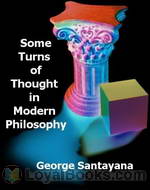 Some Turns of Thought in Modern Philosophy
Some Turns of Thought in Modern Philosophy
Before the beginning of World War II, during the time of the Modernist movement in philosophy, George Santayana wrote these five descriptive essays. He examined John Locke’s sensationalism, British Idealism, the “Theory of Relativity”, Freud’s psychology, and Julien Benda’s preachment on the relations between God and the world. [Summary written by Gary Gilberd] | |
 The Life of Reason volume 1
The Life of Reason volume 1
The Life of Reason, subtitled "the Phases of Human Progress", is a book published in five volumes from 1905 to 1906, by Spanish-born American philosopher George Santayana (1863-1952). It consists of Reason in Common Sense, Reason in Society, Reason in Religion, Reason in Art, and Reason in Science. The work is considered to be the most complete expression of Santayana's moral philosophy [...]. Santayana's philosophy is strongly influenced by the materialism of Democritus and the refined ethics of Aristotle, with a special emphasis on the natural development of ideal ends... | |
 The Sense of Beauty Being the Outlines of Aesthetic Theory
The Sense of Beauty Being the Outlines of Aesthetic Theory
| |
 Winds of Doctrine: Studies in Contemporary Opinion
Winds of Doctrine: Studies in Contemporary Opinion
Even before the Great War turned the world upside down, Western civilization was being revolutionized at all levels: intellectually, philosophically, artistically. Noted positivist philosopher George Santayana published this volume on the eve of the War, trying to portray the status of philosophy and theology at that moment by analyzing six significant topics: 1. the intellectual "temper" of the age 2. the clash between Modernism and Christianity 3. the new idealism of Henri Bergson 4. the new skepticism of Bertrand Russell 5. Shelley's fusion of philosophy and poetry 6. the so-called "genteel" tradition in American philosophy. | |
By: George Sharswood (1810-1883) | |
|---|---|
 An Essay on Professional Ethics Second Edition
An Essay on Professional Ethics Second Edition
| |
By: George Stuart Fullerton (1859-1925) | |
|---|---|
 An Introduction to Philosophy
An Introduction to Philosophy
| |
By: Giordano Bruno (1548-1600) | |
|---|---|
 The Heroic Enthusiasts (Gli Eroici Furori) Part the Second An Ethical Poem
The Heroic Enthusiasts (Gli Eroici Furori) Part the Second An Ethical Poem
| |
 The Heroic Enthusiasts (Gli Eroici Furori) Part the First An Ethical Poem
The Heroic Enthusiasts (Gli Eroici Furori) Part the First An Ethical Poem
| |
By: Goldsworthy Lowes Dickinson (1862-1932) | |
|---|---|
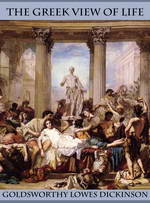 The Greek View of Life
The Greek View of Life
“With the Greek civilisation beauty perished from the world. Never again has it been possible for man to believe that harmony is in fact the truth of all existence.”This elegantly-written work provides a splendid introduction to the Greeks of the classic period: how they thought, wrote, and organised their lives and loves. Although it dates from the 1890s, there is very little about it that has dated. To its author’s credit, the subject of “Greek love” is dealt with in a sane and factual context - despite the judicial assassination of Oscar Wilde going on in the background... | |
By: H. G. Wells (1866-1946) | |
|---|---|
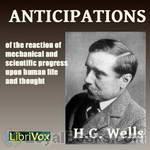 Anticipations
Anticipations
Wells considered this book one of his most important, a natural follow-up to such works as his Man of the Year Million and The Time Machine. His goal was to get people to think and act in new ways. The book starts with a look at how humans get along socially and how they carry out their business ventures. It then discusses how these elements influence others, such as politics, the world of work, and education. H. G. tried to make clear how the current social order was disintegrating without preparing another to take its place. He then traced the roots of democracy, which in its present state he saw as unworkable. Instead, he proposed a new republic. He also critiqued modern warfare. | |
 First and Last Things
First and Last Things
| |
By: Harvey Newcomb (1803-1863) | |
|---|---|
 Anecdotes for Boys
Anecdotes for Boys
| |
By: Hastings Rashdall (1858-1924) | |
|---|---|
 Philosophy and Religion Six Lectures Delivered at Cambridge
Philosophy and Religion Six Lectures Delivered at Cambridge
| |
By: Havelock Ellis (1859-1939) | |
|---|---|
 The Task of Social Hygiene
The Task of Social Hygiene
| |
By: Helen Ekin Starrett (1840-1920) | |
|---|---|
 Letters to a Daughter and A Little Sermon to School Girls
Letters to a Daughter and A Little Sermon to School Girls
Helen Ekin Starrett, journalist, mother of two daughters, grandmother of seven granddaughters and teacher to many young girls at the Starrett School for Girls offers lessons in life and religion to girls about to "pass out from the guardianship of home into life with its duties and trials". | |
By: Henri Bergson (1859-1941) | |
|---|---|
 Laughter : an Essay on the Meaning of the Comic
Laughter : an Essay on the Meaning of the Comic
| |
By: Henry A. Beers (1847-1926) | |
|---|---|
 Four Americans Roosevelt, Hawthorne, Emerson, Whitman
Four Americans Roosevelt, Hawthorne, Emerson, Whitman
| |
By: Henry David Thoreau (1817-1862) | |
|---|---|
 Walden
Walden
Two years, two months and two days! This is what forms the time line of one man's quest for the simple life and a unique social experiment in complete self reliance and independence. Henry David Thoreau published Walden in 1884. Originally drafted as a series of essays describing a most significant episode in his life, it was finally released in book form with each essay taking on the form of a separate chapter. Thoreau's parents were in financial straights, but rich intellectually and culturally... | |
By: Henry Drummond | |
|---|---|
 The Greatest Thing in the World and Other Addresses
The Greatest Thing in the World and Other Addresses
The spiritual classic The Greatest Thing In the World is a trenchant and tender analysis of Christian love as set forth in the thirteenth chapter of I Corinthians. The other addresses speak to other aspects of Christian life and thought. | |
 Addresses
Addresses
| |
By: Henry F. (Henry Frey) Lutz | |
|---|---|
 To Infidelity and Back
To Infidelity and Back
| |
By: Henry Frederick Cope (1870-1923) | |
|---|---|
 Levels of Living Essays on Everyday Ideals
Levels of Living Essays on Everyday Ideals
| |
By: Henry L. Mencken (1880-1956) | |
|---|---|
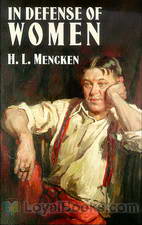 In Defense of Women
In Defense of Women
In Defense of Women is H. L. Mencken’s 1918 book on women and the relationship between the sexes. Some laud the book as progressive while others brand it as reactionary. While Mencken didn’t champion women’s rights, he described women as wiser in many novel and observable ways, while demeaning average men. According to Mencken’s biographer, Fred Hobson: Depending on the position of the reader, he was either a great defender of women’s rights or, as a critic labelled him in 1916, ‘the greatest misogynist since Schopenhauer’,'the country’s high-priest of woman-haters.’ | |
By: Henry Longueville Mansel (1820-1871) | |
|---|---|
 The Philosophy of the Conditioned
The Philosophy of the Conditioned
| |
By: Henry More (1614-1687) | |
|---|---|
 Democritus Platonissans
Democritus Platonissans
| |
By: Herbert Spencer (1820-1903) | |
|---|---|
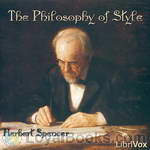 The Philosophy of Style
The Philosophy of Style
“The Philosophy of Style,” explored a growing trend of formalist approaches to writing. Highly focused on the proper placement and ordering of the parts of an English sentence, [Spencer] created a guide for effective composition. Spencer’s aim was to free prose writing from as much “friction and inertia” as possible, so that the reader would not be slowed by strenuous deliberations concerning the proper context and meaning of a sentence. | |
 Essays: Scientific, Political, & Speculative, Vol. I
Essays: Scientific, Political, & Speculative, Vol. I
| |
By: Hugh Black (1868-1953) | |
|---|---|
 Friendship
Friendship
The idea, so common in the ancient writers, is not all a poetic conceit, that the soul of a man is only a fragment of a larger whole, and goes out in search of other souls in which it will find its true completion. We walk among worlds unrealized, until we have learned the secret of love. We know this, and in our sincerest moments admit this, even though we are seeking to fill up our lives with other ambitions and other hopes. In spite of the vulgar materialism of our day, we do feel that the spiritual side of life is the most important, and brings the only true joy... | |
By: Immanuel Kant (1724-1804) | |
|---|---|
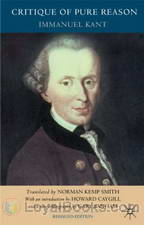 The Critique of Pure Reason
The Critique of Pure Reason
The Critique of Pure Reason, first published in 1781 with a second edition in 1787, has been called the most influential and important philosophical text of the modern age. Kant saw the Critique of Pure Reason as an attempt to bridge the gap between rationalism (there are significant ways in which our concepts and knowledge are gained independently of sense experience) and empiricism (sense experience is the ultimate source of all our concepts and knowledge) and, in particular, to counter the radical empiricism of David Hume (our beliefs are purely the result of accumulated habits, developed in response to accumulated sense experiences)... | |
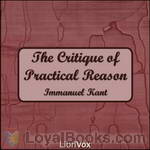 The Critique of Practical Reason
The Critique of Practical Reason
The Critique of Practical Reason (Kritik der praktischen Vernunft) is the second of Immanuel Kant’s three critiques, first published in 1788. It follows on from his Critique of Pure Reason and deals with his moral philosophy. The second Critique exercised a decisive influence over the subsequent development of the field of ethics and moral philosophy, becoming the principle reference point for ethical systems that focus on the rightness or wrongness of actions themselves, as opposed to the rightness or wrongness of the consequences of those actions... | |
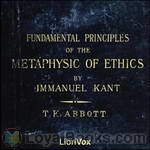 Fundamental Principles of the Metaphysic of Morals
Fundamental Principles of the Metaphysic of Morals
The Fundamental Principles of the Metaphysic of Morals, also known as The Groundwork of the Metaphysics of Morals or Foundations of the Metaphysics of Morals or Grounding of the Metaphysics of Morals, is Immanuel Kant's first contribution to moral philosophy. It argues for an a priori basis for morality. Where the Critique of Pure Reason laid out Kant's metaphysical and epistemological ideas, this relatively short, primarily meta-ethical, work was intended to outline and define the concepts and arguments shaping his future work The Metaphysics of Morals. However, the latter work is much less readable than the Fundamental Principles. | |
 The Metaphysical Elements of Ethics
The Metaphysical Elements of Ethics
| |
By: Inazo Nitobe (1862-1933) | |
|---|---|
 Bushido: The Soul of Japan
Bushido: The Soul of Japan
Bushido: The Soul of Japan written by Inazo Nitobe was one of the first books on samurai ethics that was originally written in English for a Western audience, and has been subsequently translated into many other languages (also Japanese). Nitobe found in Bushido, the Way of the Warrior, the sources of the virtues most admired by his people: rectitude, courage, benevolence, politeness, sincerity, honor, loyalty and self-control, and he uses his deep knowledge of Western culture to draw comparisons with Medieval Chivalry, Philosophy, and Christianity. | |
By: Isaac Barrow (1630-1677) | |
|---|---|
 Sermons on Evil-Speaking
Sermons on Evil-Speaking
| |
By: Isaac Husik (1876-1939) | |
|---|---|
 A History of Mediaeval Jewish Philosophy
A History of Mediaeval Jewish Philosophy
| |
By: J Hudson Taylor (1832-1905) | |
|---|---|
 Union and Communion - or Thoughts on the Song of Solomon
Union and Communion - or Thoughts on the Song of Solomon
This little book, whose design is to lead the devout Bible student into the Green Pastures of the Good Shepherd, thence to the Banqueting House of the King, and thence to the service of the Vineyard, is one of the abiding legacies of Mr. Hudson Taylor to the Church. In the power of an evident unction from the Holy One, he has been enabled herein to unfold in simplest language the deep truth of the believer's personal union with the Lord, which under symbol and imagery is the subject of The Song of Songs. (From the Foreword by J Stuart Holden). | |
By: J. Cameron (James Cameron) Lees (1834-1913) | |
|---|---|
 Life and Conduct
Life and Conduct
| |
By: J. M. (John Mackinnon) Robertson (1856-1933) | |
|---|---|
 Montaigne and Shakspere
Montaigne and Shakspere
| |